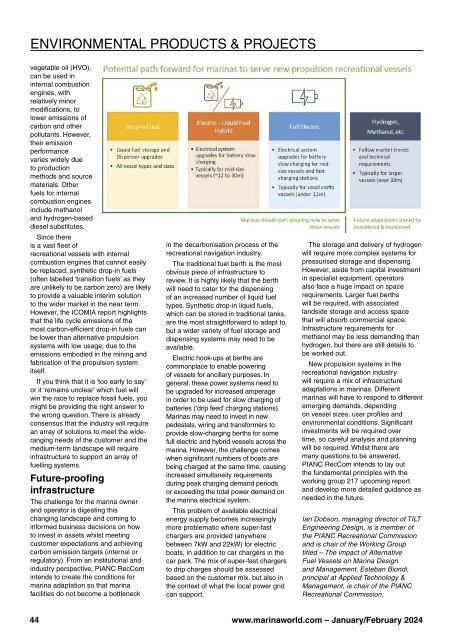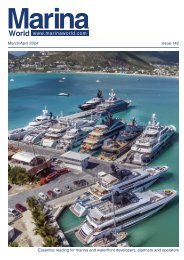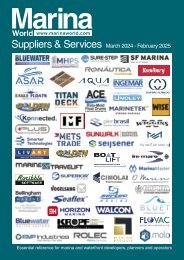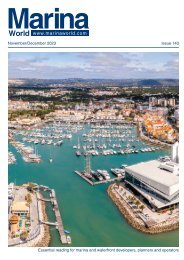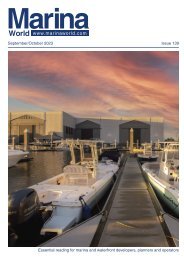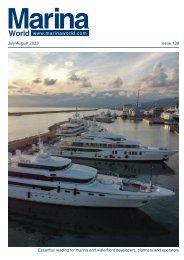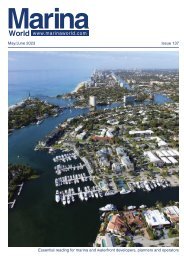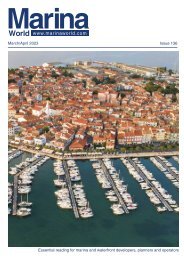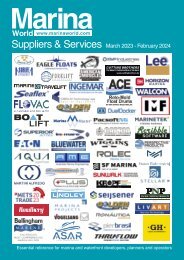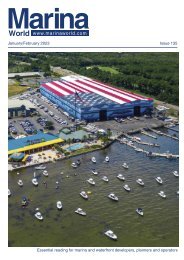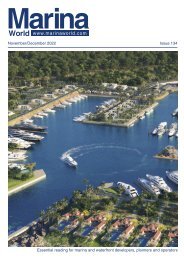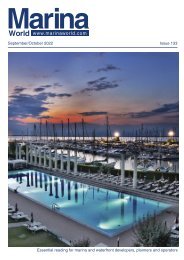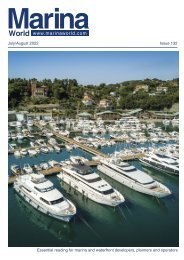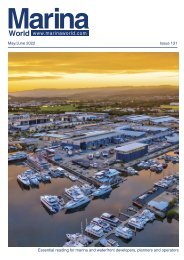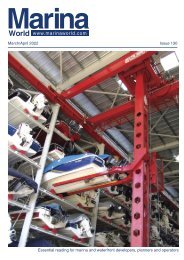2024 January/February Marina World
The magazine for the marina industry
The magazine for the marina industry
Create successful ePaper yourself
Turn your PDF publications into a flip-book with our unique Google optimized e-Paper software.
ENVIRONMENTAL PRODUCTS & PROJECTS<br />
vegetable oil (HVO),<br />
can be used in<br />
internal combustion<br />
engines, with<br />
relatively minor<br />
modifications, to<br />
lower emissions of<br />
carbon and other<br />
pollutants. However,<br />
their emission<br />
performance<br />
varies widely due<br />
to production<br />
methods and source<br />
materials. Other<br />
fuels for internal<br />
combustion engines<br />
include methanol<br />
and hydrogen-based<br />
diesel substitutes.<br />
Since there<br />
is a vast fleet of<br />
recreational vessels with internal<br />
combustion engines that cannot easily<br />
be replaced, synthetic drop-in fuels<br />
(often labelled ‘transition fuels’ as they<br />
are unlikely to be carbon zero) are likely<br />
to provide a valuable interim solution<br />
to the wider market in the near term.<br />
However, the ICOMIA report highlights<br />
that the life cycle emissions of the<br />
most carbon-efficient drop-in fuels can<br />
be lower than alternative propulsion<br />
systems with low usage, due to the<br />
emissions embodied in the mining and<br />
fabrication of the propulsion system<br />
itself.<br />
If you think that it is ‘too early to say’<br />
or it ‘remains unclear’ which fuel will<br />
win the race to replace fossil fuels, you<br />
might be providing the right answer to<br />
the wrong question. There is already<br />
consensus that the industry will require<br />
an array of solutions to meet the wideranging<br />
needs of the customer and the<br />
medium-term landscape will require<br />
infrastructure to support an array of<br />
fuelling systems.<br />
Future-proofing<br />
infrastructure<br />
The challenge for the marina owner<br />
and operator is digesting this<br />
changing landscape and coming to<br />
informed business decisions on how<br />
to invest in assets whilst meeting<br />
customer expectations and achieving<br />
carbon emission targets (internal or<br />
regulatory). From an institutional and<br />
industry perspective, PIANC RecCom<br />
intends to create the conditions for<br />
marina adaptation so that marina<br />
facilities do not become a bottleneck<br />
in the decarbonisation process of the<br />
recreational navigation industry.<br />
The traditional fuel berth is the most<br />
obvious piece of infrastructure to<br />
review. It is highly likely that the berth<br />
will need to cater for the dispensing<br />
of an increased number of liquid fuel<br />
types. Synthetic drop-in liquid fuels,<br />
which can be stored in traditional tanks,<br />
are the most straightforward to adapt to,<br />
but a wider variety of fuel storage and<br />
dispensing systems may need to be<br />
available.<br />
Electric hook-ups at berths are<br />
commonplace to enable powering<br />
of vessels for ancillary purposes. In<br />
general, these power systems need to<br />
be upgraded for increased amperage<br />
in order to be used for slow charging of<br />
batteries (‘drip feed’ charging stations).<br />
<strong>Marina</strong>s may need to invest in new<br />
pedestals, wiring and transformers to<br />
provide slow-charging berths for some<br />
full electric and hybrid vessels across the<br />
marina. However, the challenge comes<br />
when significant numbers of boats are<br />
being charged at the same time, causing<br />
increased simultaneity requirements<br />
during peak charging demand periods<br />
or exceeding the total power demand on<br />
the marina electrical system.<br />
This problem of available electrical<br />
energy supply becomes increasingly<br />
more problematic where super-fast<br />
chargers are provided (anywhere<br />
between 7kW and 22kW) for electric<br />
boats, in addition to car chargers in the<br />
car park. The mix of super-fast chargers<br />
to drip charges should be assessed<br />
based on the customer mix, but also in<br />
the context of what the local power grid<br />
can support.<br />
The storage and delivery of hydrogen<br />
will require more complex systems for<br />
pressurised storage and dispensing.<br />
However, aside from capital investment<br />
in specialist equipment, operators<br />
also face a huge impact on space<br />
requirements. Larger fuel berths<br />
will be required, with associated<br />
landside storage and access space<br />
that will absorb commercial space.<br />
Infrastructure requirements for<br />
methanol may be less demanding than<br />
hydrogen, but there are still details to<br />
be worked out.<br />
New propulsion systems in the<br />
recreational navigation industry<br />
will require a mix of infrastructure<br />
adaptations in marinas. Different<br />
marinas will have to respond to different<br />
emerging demands, depending<br />
on vessel sizes, user profiles and<br />
environmental conditions. Significant<br />
investments will be required over<br />
time, so careful analysis and planning<br />
will be required. Whilst there are<br />
many questions to be answered,<br />
PIANC RecCom intends to lay out<br />
the fundamental principles with the<br />
working group 217 upcoming report<br />
and develop more detailed guidance as<br />
needed in the future.<br />
Ian Dobson, managing director of TILT<br />
Engineering Design, is a member of<br />
the PIANC Recreational Commission<br />
and is chair of the Working Group<br />
titled – The impact of Alternative<br />
Fuel Vessels on <strong>Marina</strong> Design<br />
and Management. Esteban Biondi,<br />
principal at Applied Technology &<br />
Management, is chair of the PIANC<br />
Recreational Commission.<br />
44 www.marinaworld.com – <strong>January</strong>/<strong>February</strong> <strong>2024</strong>


